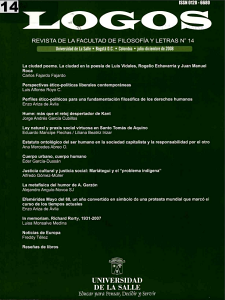Abstract
<p>The contemporary question for the articulation between the demands for social justice, and the demands for cultural justice is not a brand new one nowadays: That question has manifested itself since the 19th century, at least, in the social commitment of some "marginal” figures who tried to think the demands of social justice from a socialist perspective. In a more or less intuitive, more or less reflexive, way, those precursors that can be found in the libertarian socialism tradition, as well as in the Marxist socialism joint both demands of justice on the unity of a practice and/or a thought, without outlining as such the theoretical issue of its articulation. In the tradition of the marxist socialism, the first, and maybe the most important representative of those precursors is José Carlos Mariátegui (1895 – 1930), whose theoretical and practical work was, during a long time, condemned to marginality for the censors of the dogmatic Marxism. In the tradition of the libertarian socialism, and farther in time, the figure of Louise Michel holds, in a practical way, the idea of a social ethics of recognition, capable of the integration of the acknowledgement of the cultural differences – raising the incomprehension of most of his militant companions in the working-men movement.</p>Downloads
Download data is not yet available.



